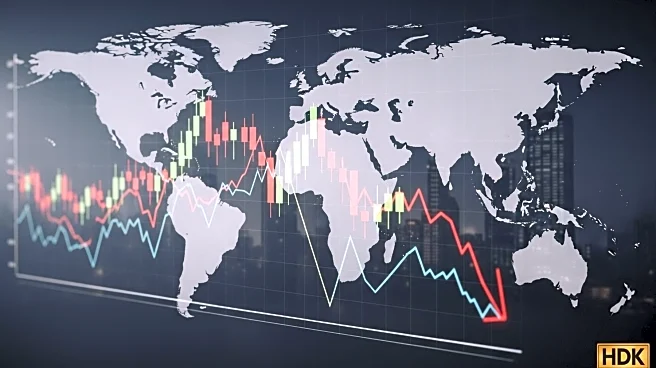What is the story about?
What's Happening?
Asia-Pacific markets experienced mixed trading on Wednesday following declines on Wall Street. U.S. Federal Reserve Chair Jerome Powell commented that equity prices are highly valued, signaling uncertainty in the rate-cutting path and a challenging situation for the central bank. Australia's ASX/S&P 200 closed lower, while Japan's Nikkei 225 and Topix indices saw gains. South Korea's Kospi and Kosdaq faced losses, although defense stocks rallied due to President Trump's support for Ukraine and continued U.S. weapon supplies to NATO. Hong Kong's Hang Seng Index and mainland China's CSI 300 closed higher, despite severe weather conditions from Super Typhoon Ragasa. Alibaba's shares in Hong Kong surged over 6% following CEO Eddie Wu's announcement of increased investment in artificial intelligence.
Why It's Important?
The mixed performance of Asia-Pacific markets highlights the global impact of U.S. economic policies and statements from key figures like the Federal Reserve Chair. Powell's comments on stock valuation and the uncertain rate-cutting path contribute to market volatility, affecting investor sentiment worldwide. The rally in South Korean defense stocks underscores the geopolitical implications of U.S. foreign policy, particularly in relation to NATO and Ukraine. Alibaba's significant investment in AI reflects the growing importance of technology in driving market trends and corporate strategies. These developments illustrate the interconnectedness of global markets and the influence of U.S. economic decisions on international trading dynamics.
What's Next?
Investors will closely monitor further statements from the U.S. Federal Reserve and any policy changes that could impact global markets. The appointment of Anna Breman as the new governor of the Reserve Bank of New Zealand marks a significant leadership change, with potential implications for New Zealand's monetary policy. South Korea's role as a major supplier of military equipment to NATO may continue to influence its defense sector's performance. Alibaba's commitment to AI investment suggests ongoing developments in technology infrastructure, which could drive future growth and innovation in the sector.
Beyond the Headlines
The broader implications of Powell's comments on stock valuation extend beyond immediate market reactions. They raise questions about the sustainability of current equity prices and the potential for future corrections. The geopolitical dynamics involving U.S. support for Ukraine and NATO highlight the strategic importance of defense industries in global politics. Alibaba's focus on AI investment reflects the increasing role of technology in shaping corporate strategies and market competitiveness. These factors contribute to a complex landscape where economic, political, and technological elements intersect, influencing global market trends and investor decisions.
















